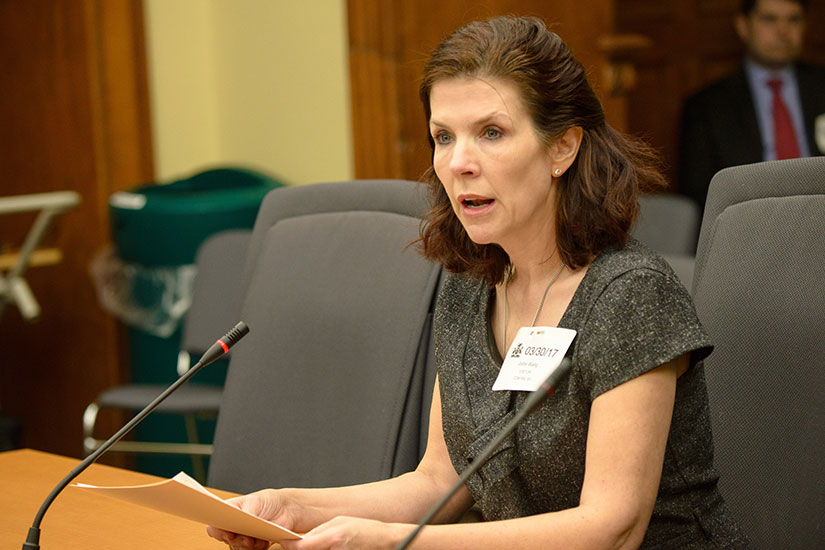Guided by principles of “patient autonomy and patient access to care” College of Physicians and Surgeons of Ontario (CPSO) president Dr. David Rouselle told the Standing Committee on Finance and Economic Affairs it was sticking by its policy requiring doctors to provide an “effective referral” whenever a patient asks for assisted suicide.
“The college’s expectations are designed to protect vulnerable patients,” Rouselle said.
But the college’s rules aren’t fair to doctors who object and aren’t necessary to provide access to medical assistance in dying (MAID), said Barb LeBlanc of the Ontario Medical Association.
The medical profession is evenly split between doctors who support MAID and those who oppose, LeBlanc said.
“That puts us in a very difficult position,” she said.
“Creative solutions” could ensure patients who want MAID will get it, while at the same time allowing doctors to opt out of referring for euthanasia.
Speaking as a member of Concerned Ontario Doctors, which recently voted down an agreement between the province and the Ontario Medical Association on billing, Kitchener's Dr. Jodie Wang put her opposition to the CPSO duty-to-refer policy in terms of the Hippocratic Oath.
“Above all, I must not play at God,” Wang said.
A “telehealth” toll-free phone number and a well-advertised web site could allow patients, their families, friends and advocates to initiate MAID assessments without demanding a formal referral from doctors against their will and conscience, she said.
“What the doctors of Ontario want is not to impose on anybody or restrict anybody’s access,” said Wang.
Without an amendment to protect the conscience rights of doctors, Bill-84, combined with the CPSO regulations, would make Ontario the “first jurisdiction in the democratic world to have a group of individuals who do not have conscience rights,” said Wang.
 “Above all, I must not play at God,” Kitchener’s Dr. Jodie Wang told the Standing Committee on Finance and Economic Affairs March 30. (Photo by Michael Swan)
“Above all, I must not play at God,” Kitchener’s Dr. Jodie Wang told the Standing Committee on Finance and Economic Affairs March 30. (Photo by Michael Swan)
Asked whether the college could show flexibility if a care co-ordination service allowed patients to self-refer, CPSO lawyer Vicki White pointed out the issue is before the courts.
“We’re not opposed to patient-centred access,” said White. “We don’t think it takes away from the doctor’s duty to refer…. Without such an expectation the concern is that vulnerable patients would be left alone.”
The Ontario Medical Association argued doctor referrals are not necessarily the best way to ensure access to MAID.
In consultations on Bill-84, the issue of conscience protections for doctors was never addressed, said LeBlanc.
“The Ministry (of Health) has relied on the fact the CPSO had a policy and they wanted to be consistent with that,” she said. “It has really been left to this committee to hash it out.”
The OMA wants an amendment that would say conscience rights of medical professions “should supersede any regulatory college’s rules.”
Regulatory colleges that govern nurses and naturopaths also require their members with conscientious objections to refer for assisted suicide.
GTA MAID co-founder Dr. Ed Weiss called the arguments in favour of enshrining conscience rights in Bill-84 “erroneous and misleading.”
“To my colleagues who claim conscience rights, I say that you went into medicine to be a force for good and to be an advocate for your patients — which means that sometimes you have to make decision you’re not comfortable with, not rest on your laurels and leave the helpless to fend for themselves in a system that can be difficult to navigate even at the best of times,” said Weiss.
A self-referral, patient-navigator system would not be sufficient to guarantee access to frail and isolated patients, he said. Weiss related the case of a mostly housebound, frail patient with advanced HIV-related complications whose phone was broken and could not afford a new one.
“He has no friends or family to ask for help with his request. I ask you to ponder how someone like him can access MAID if not through the referral of his trusted doctor?” he said.
The Ontario Hospital Association complained that MAID access is too hospital centred. In jurisdictions around the world where doctor-assisted suicide is legal, 90 per cent of life-ending procedures are conducted at the patients’ homes. An all-hospital system is “not sustainable,” said Ontario Hospital Association ethicist Andrea Frolic.
Frolic urged the legislators to “develop that capacity in communities, rather than localizing it in hospitals.”


